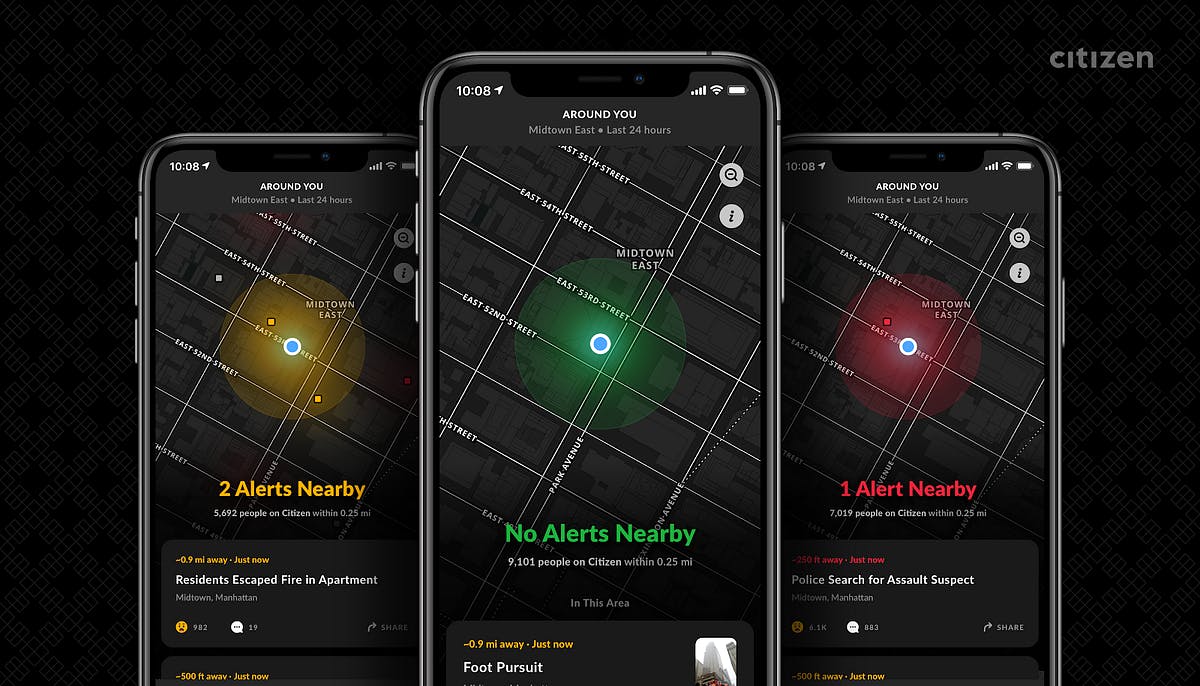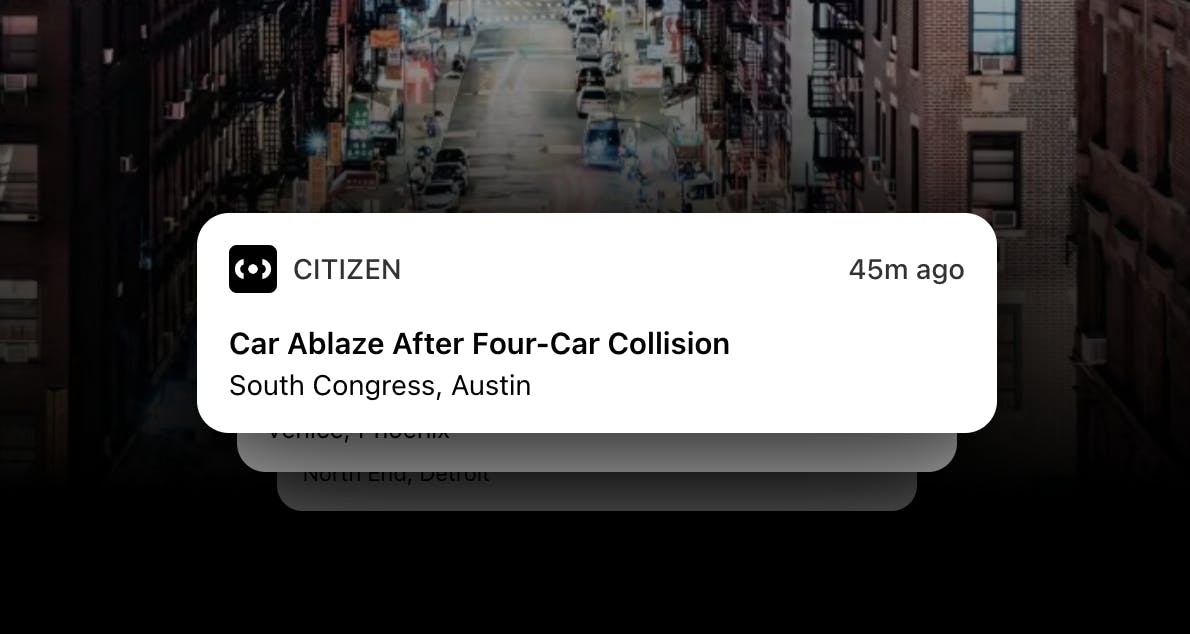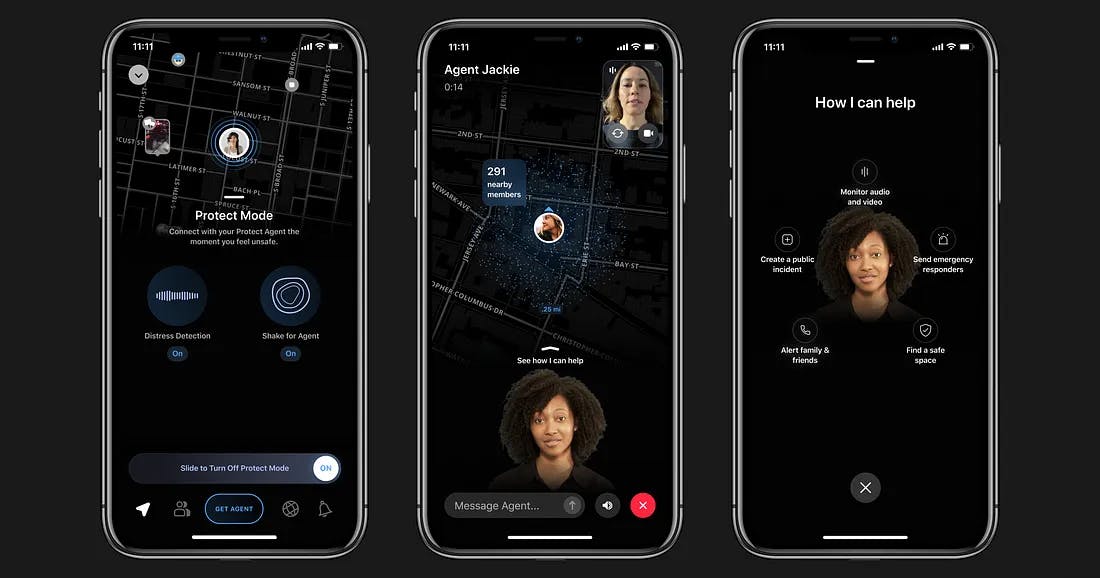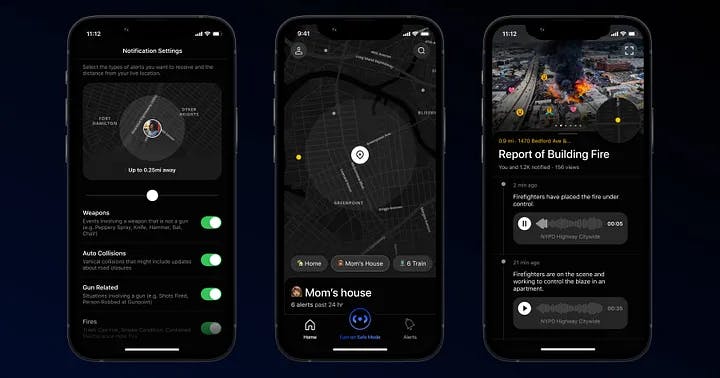Thesis
Every day, the US 911 dispatch call center receives over 600K calls. In 2022, the FBI reported nearly 2K property crimes for every 100K people in the US. With only one police officer for every 286 people in the US as of 2022, law enforcement continually grapples with the challenges of preventing, responding to, and investigating crime. Police officers can’t be everywhere all at once. When a crime happens, response time is crucial — by the time an officer arrives on the scene, it could be too late to prevent a crime or catch a criminal. This is a growing issue: The average police response time increased from 13 minutes in 2019 to 16 minutes in 2022.
Meanwhile, the public is often left in the dark with delayed or fragmented information about unfolding crime incidents and public safety issues. Critical, time-sensitive information on crime is typically relayed through traditional news outlets, and the lack of real-time information leaves citizens uninformed and ill-prepared to respond to potential threats. Additionally, only a fraction of crimes are actually reported. For example, 50% of violent crimes and 70% of property crimes went unreported in 2023. Whether due to fear, a sense of inconsequence, or a lack of faith in the system, underreporting clouds people’s understanding of the crime landscape. The communication gap between law enforcement and the public has not only hindered the possibility of collaborative crime prevention but can also erode the trust necessary for a safe community.
Citizen seeks to rectify this with a digital safety network that leverages real-time information on crimes to increase the public’s awareness of safety issues. The app provides real-time 911 alerts and allows users to contribute toward resolving situations by broadcasting live videos and sharing relevant updates. This kind of crowdsourced crime reporting is intended to foster transparency by filling the gap left by traditional news outlets and providing users with immediate, accurate information about safety issues in their surroundings. In a world where crime is a persistent problem, Citizen seeks to offer a timely, crowd-sourced, approach to safety by integrating technology and community involvement.
Founding Story
Citizen was founded by Andrew Frame (CEO), Luis Samaniego (former head of design), and JD Maresco (former head of product & operations) in 2015. It launched publicly in October 2016 and was called Vigilante until it rebranded to Citizen in March 2017.
Frame, a high school dropout with a keen interest in computers, created his first startup, an internet service provider, at 15 years old. Around the same time, he also hacked into NASA’s Jet Propulsion Laboratory because he was curious about UFOs. Two years later, he was arrested by the FBI for this crime and was punished with a $25K fine, 100 hours of community service, and five years of probation instead of jail time. He likened his reason for hacking to “young entrepreneur kids” and stated he felt like a curious “five year old kid who snuck into FAO Schwarz just to look around.”
Frame also learned how to write open-source software by the time he was a teenager, so he joined Cisco at 17 years old as a support engineer in January 1997. He then left Cisco in June 2001 to join Procket Networks as a software engineer. Next, in August 2004, he founded Ooma, a cloud-based Voice over Internet Protocol (VoIP) service that provides phone and communication solutions for homes and businesses. In its early days, Ooma competed with companies like AT&T and Verizon. While there, Frame became “burnt-out and exhausted” from the company’s struggle to gain market share. As a result, he brought in Eric Stang to replace him as CEO in January 2009 and left the company. As of October 2024, Ooma is a public company with a market cap of $324.5 million.
Around the same time Frame founded Ooma, he had also briefly collaborated with Mark Zuckerberg and Sean Parker to help Facebook set up its network architecture. This experience yielded him an eight-figure fortune because Zuckerberg gave him an undisclosed amount of Facebook’s shares for a “couple weeks of work.”
After leaving Ooma in 2009, Frame moved to LA and enrolled in a six-month film program with Hollywood producer Joan Scheckel. He had no intention of writing movies but joined the program because “there are a lot of analogies between the filmmaking process and creating consumer technologies.” He used his experiences in film to define his criteria for his next startup: it had to be mission-oriented, consumer-based, mobile, network-driven, and unique.
As a result, in 2015, Frame moved to New York City and created sp0n, a startup technology incubator with the objective of founding a mission-oriented, consumer-based company. He recruited a few engineers and invested $300K to launch the incubator. In 2015, while observing old buildings in Lower Manhattan, Frame had the idea to use smartphones to capture emergency calls to promote safety among these buildings, and within a week, his engineers at sp0n developed a prototype. They developed that prototype into a company called Vigilante in 2015.
Vigilante promised to democratize the 911 system by alerting users whenever nearby crimes were reported to 911 and motivating users to visit, record, and share real-time information about crime scenes in their areas. “Transparency is the single most powerful tool in the fight against crime and injustice, and we believe it will rebuild cooperation towards a shared vision,” Vigilante’s announcement post read. Within 48 hours, Vigilante’s release video went viral, and the app had service requests from users in all 50 states and dozens of countries.
Despite its popularity, Vigilante faced controversy for promoting mob justice. Critics were concerned that the app could encourage users to rush toward crime scenes or intervene in dangerous situations, especially given the connotations of its name. A week after its launch, it was removed from the App Store for encouraging or risking physical harm. In March 2017, Vigilante rebranded to Citizen with the same mission but with stronger guidance to “never approach a crime scene, interfere with an incident, or get in the way of police.”
Product
Citizen is a public safety app that allows users to receive real-time alerts about nearby incidents, such as crimes or emergencies, based on their location. It crowdsources reports from users and public safety radio frequencies, offering live incident updates, video streaming, and a feature to report suspicious activity directly to the app.
Active Incident Coverage

Source: Citizen
Citizen’s active incident coverage, one of its main offerings, provides live updates on safety incidents as they unfold. Upon opening the app, users are brought to an interactive map of their nearby area, reminiscent of a radar tracking system. Citizen gathers information about crime from resources including police scanners, public safety radio channels, verified public data from government agencies and local departments, and user reports. This information is organized and presented to users in a feed-like interface.
Citizen also enables users to contribute to the coverage by broadcasting live video from the scene of a fire, car wreck, crime, or other incident. To help ensure the accuracy and reliability of user-reported incidents, Citizen employs analysts to individually review and verify safety alerts. Citizen organizes its reports by using a custom-built AI to process live emergency radio transmissions, filtering out background noise and identifying details like location and incident type. The AI highlights relevant information such as people, objects, and street names, which are then mapped to the location of the event. After that, a communication analyst verifies the information, writes a brief notification, and sends alerts to users within a specified radius, depending on the type of incident. This process enables one analyst to cover multiple cities during a shift.
Safety Alerts

Source: Citizen
The Citizen app acts as a safety network that sends alerts about nearby safety issues or incidents in real time. These alerts are designed to be immediate and actionable and provide users with the information they need to stay safe. For example, Citizen alerts go out within seconds of a 911 or user report, and if there’s an incident nearby, users will be notified to avoid the area.
Each notification includes the nature of the incident, its precise location, and advice on what to do if relevant. Safety alerts can also be customized to align with user needs and preferences. Users can choose what type of safety alerts they want to see as well as the size of the radius they want to be notified from. Together, the active incident coverage and safety alerts form the backbone of Citizen’s real-time safety network.
Citizen Premium (Citizen Protect)

Source: Citizen
Launched in August 2021, Citizen Premium, also known as Citizen Protect, is an on-demand, personalized, mobile protection subscription service that gives users “24/7 access to Citizen’s team of highly trained Protect agents.” Citizen agents come from a range of backgrounds and hundreds of thousands of situations including former 911 dispatchers, paramedics, social workers, and high-touch customer service representatives. All Citizen agents have completed basic emergency response training.
For $19.99 per month, users can connect with an on-demand agent whenever they need help. A user can communicate with the agent via video, audio, and messaging, and the agent will monitor their location to stay connected with the user until they reach their destination. The agent can also create alerts for the user’s designated emergency contacts and nearby Citizen users, guide the user to a safe place, and send emergency responders to their exact location. Citizen Premium is not designed to be utilized solely in emergency situations. It's also available to give people peace of mind throughout their daily lives. Having a personal agent on-demand at all times is intended to give users a sense of security.
For example, if a user wants to go out on a walk at night, Protect Agents can stay connected with them and monitor them until they reach home. Citizen Premium also includes a “protect mode” that includes features such as “Shake for Agent”, where the user can shake their phone twice to be connected to an agent, and “Distress Detection”, which monitors the device of the users audio, designed to be used when the user is unable to talk.
Citizen Plus
Launched in April 2023, Citizen Plus is Citizen’s mid-tier subscription service. The benefit of Citizen Plus over the free Citizen account is that Citizen Plus provides premium alerts and additional safety information. For $5.99/month, subscribers to Citizen Plus have access to live police and fire radio feeds, providing real-time communication between emergency responders on unfolding incidents.
It also allows for alert customization, where users can choose which types of alerts they want to receive, and set the radiuses for these alerts. Citizen’s on-demand agents then monitor real-time X (former Twitter) activity, police radio, and user-uploaded videos to send these custom alerts to Citizen Plus users. Additionally, while free users can access incidents that occurred within 24 hours, Citizen Plus users unlock the record of historical incidents and their details from the past 90 days.

Source: Citizen
Market
Customer
With both free and paid plan options, Citizen is designed for users with varying degrees of interest in personal and community safety. As of October 2024, Citizen is accessible in 60 cities in the US including New York City, San Francisco, and Chicago. According to a 2024 report, San Francisco had the highest property crime rate among the largest cities in the US. Urban areas have higher crime rates and denser populations, which allows Citizen to crowdsource real-time safety information for those who want to stay informed about nearby emergencies like crimes, accidents, or natural disasters.
Citizen also attracts users interested in community-based reporting, allowing them to both receive and share live updates. Law enforcement agencies, safety-conscious families, and those who value hyper-local safety information are core users, seeking up-to-the-minute notifications to make informed decisions about their surroundings.
Starting in February 2023, Citizen also expanded its customer strategy to target vulnerable groups that may have heightened safety concerns. For example, it offered 20K free one-year premium subscriptions to Asian Americans in the Bay Area, translating onboarding materials on the app into Chinese and recruiting Asian American users from this group. This initiative was a trial run for revamping the app to appeal to groups who have historically distrusted law enforcement. Other groups that received free one-year premium subscriptions include gang violence interrupters in Chicago and a Black trans and queer organization in Atlanta. Beyond these groups, Citizen was also used by protestors in 2020 to monitor protests and police responses.
Market Size
Citizen operates in the public safety and security market, an industry that includes a variety of services and solutions including surveillance systems, communication networks, disaster recovery solutions, and medical services. In 2024, the global public safety market was valued at $511.1 billion. It is expected to reach $764.4 billion with an expected CAGR of 8.4% by 2029. Factors driving the growth of the public safety and security market include heightened security awareness, the need to upgrade outdated public safety infrastructure, and the growing adoption of advanced technologies like AI, machine learning, and the Internet of Things (IoT).
Competition
Company Platforms
Nextdoor: Founded in 2008, Nextdoor is a social networking platform that connects people with their neighbors. Nextdoor offers a variety of features allowing users to buy and sell goods, discuss local issues, and advertise local services. The platform is similar to Citizen in that it’s used as a neighborhood watch app, as users can alert neighbors about safety concerns, crimes, or emergencies. However, Nextdoor also considers itself to be the “world’s largest social network for the neighborhood.” It focuses on connecting its users with one another while Citizen helps build out its users’ inner circle of people in their neighborhood to create a personal safety network. Nextdoor’s crowdsourced safety alerts also led to complaints of racial profiling in March 2015. It addressed those concerns by rewriting its software and policies.
As of 2024, Nextdoor had 95 million verified users globally in 335K neighborhoods throughout 11 countries. In the US, one in three households were Nextdoor users. It went public through a SPAC in November 2021 and has a market cap of $991.6 million as of October 2024. It reported an annual revenue of $218.3 million and a net loss of $147.8 million in 2023.
Noonlight: Founded in 2013, Noonlight is a safety app that offers on-demand emergency response services. Its central feature is a panic button that sends out a signal to connect with emergency services and share safety information, such as a user’s location, personal details, and health information. Noonlight started as a solution to help users walk alone safely but evolved into “a suite of emergency response APIs backing some of the smartest home, health, and lifestyle products in the IoT market.”
Noonlight also has integrations with apps like Tinder to give users “backup” every time they meet someone new, in case they feel unsafe. It can also be paired up with wearable devices like Apple Watches and Fitbits to detect emergencies or sudden health problems. Compared to Citizen, Noonlight focuses more on individual health and safety rather than community-oriented safety. While Citizen provides real-time community alerts about local incidents, Noonlight emphasizes a direct connection to emergency services for personal health and safety crises. In 2022, Noonlight had over 3.5 million users; it was acquired by Alarm.com in October 2022 for an undisclosed amount.
Neighbors: Neighbors is an app that was developed by Amazon’s Ring and launched in 2018. Ring is a home security company owned by Amazon that provides a range of security products including smart doorbells, security cameras, and security systems, created Neighbors as a complementary service to its home security products.
The Neighbors app allows its community members to share real-time safety information and local crime. Users can post safety concerns such as suspicious activity, crime, missing people or pets, and even share footage from their Ring security cameras. Neighbors differentiates itself through its integration with Ring's hardware ecosystem, encouraging the sharing of surveillance footage among users to enhance community safety. Its user base and financial performance are not publicly disclosed.
Government Platforms
Various municipalities have also launched safety alert apps for their residents. For example, in September 2017, New York City launched Notify NYC, with similar apps launched in Seattle, Chicago, San Francisco, and Los Angeles.
While these government apps offer fewer features than privately developed apps like Citizen, they have the advantage of increased authority and credibility through their government affiliation. While Citizen primarily sources its alerts from individual users, notifications from government apps are directly from law enforcement. This key distinction could validate government apps, as Citizen and its non-government competitors have previously been criticized for spreading misinformation and unjustified fear.
Additionally, as software development becomes more advanced and accessible, these government apps may add features that differentiate Citizen from its competitors. Already, Chicago’s safety app has a “CHI Safe Walk” feature that allows users to have trusted contacts monitor their walk. Therefore, the growth of these government-run apps could threaten the popularity of privately developed apps like Citizen. However, on the flip side, some experts believe that users are unwilling to give their government personal information by downloading law enforcement apps.
Business Model
Citizen operates on a freemium business model, offering both free and subscription-based services to its users. All users can access its free “Active Incident Reporting” and “Safety Alerts” offerings to reach a wide user base and build a community of users who create a safety network. The free version can also help attract customers to Citizen’s two paid subscription service options, which offer additional safety features.
In 2020, Citizen introduced its premium subscription service, Citizen Premium (also called Citizen Protect). For $19.99 a month, premium subscribers get 24/7 access to Citizen’s agents who can act as digital bodyguards. In April 2023, Citizen launched Citizen Plus, a subscription-based service that sits between Citizen’s free and Premium offerings. Available for $5.99 a month, it gives users access to features including live police and fire radios, personalized alert customization, and past incidents.
Citizen’s appeal comes from user-added reports, and encouraging these reports is critical to the business’s future success. One of Citizen’s focuses is recruiting “field team members” through online job listings, offering members between $200 and $250 per day to track down and livestream local incidents. In 2021, Citizen had 12 such field team members in total.
Traction
As of October 2024, Citizen has sent over 10 billion alerts to its 9 million users. Citizen operates throughout 60 cities in the US including Austin, Baltimore, Chicago, Cincinnati, Detroit, Houston, Indianapolis, Los Angeles, Miami, New York City, Philadelphia, Phoenix, the San Francisco Bay Area, and Tucson.
As of September 2024, an unverified estimate indicated that Citizen’s revenue could be around $35 million, and as of February 2024, it had over 15 million app downloads. During the 2020 protests decrying the murder of George Floyd, it landed at the top of Apple charts, surpassing Twitter (now X), Nextdoor, CNN, Fox News, and The New York Times, despite it being operational in 18 US cities at the time. Citizen has also gained support from law enforcement agencies. For example, it partnered with LA County to contact trace COVID-19 in September 2020. In January 2022, Citizen acquired Harbor, a startup focused on disaster and emergency preparation.
Despite these successes, Citizen also experienced setbacks. In January 2023, it laid off 33 employees, including at least 10 engineers. In February 2023, Sequoia Capital Partner Mike Vernal was reported to have resigned from Citizen’s board after Sequoia declined to participate in further funding for the startup. Prior to this, Sequoia had been one of Citizen’s biggest backers, having led its $12 million Series A in 2017. It has been speculated that Sequoia’s move was a sign of Citizen’s struggling business.
Valuation
In January 2021, Citizen raised a $73 million Series C including a $23 million convertible note at an undisclosed valuation, bringing its total funding to $133 million. Its investors include Greycroft, Goodwater Capital, 8VC, Sequoia Capital, Breyer Capital, Lux Capital, Founders Fund, RRE Ventures, and Slow Ventures.
In February 2023, Sequoia was reported to have resigned from Citizen’s board after declining to participate in further funding. It had previously been one of Citizen’s biggest backers, having led the company’s $12 million Series A in 2017. The reason for the resignation remains unknown since Sequoia declined the Financial Times’s request to comment.
Key Opportunities
Geographical Expansion
Citizen operates in 60 cities throughout the US as of October 2024. By expanding its operations into more cities, and potentially extending into other countries, Citizen may be able to increase its user base and further its defensibility through network effects. The value of the Citizen app increases for each user as the number of users grows. More users mean more eyes and ears in different locations, which can lead to faster and more accurate reports of real-time safety incidents. This could create a virtuous cycle with the addition of each market, where the increasing value of the app attracts more users, and the growing user base, in turn, enhances the value of the app.
Partnerships
Citizen's value proposition lies in its ability to provide real-time safety alerts to users, but this capability also has the potential to assist law enforcement, local government agencies, and other private security firms. By forming partnerships with these entities, Citizen can enhance its sources of information but also serve as a real-time data platform that could aid in quicker emergency response times, more effective deployment of first responders and resources, and improve public safety measures. For example, in an emergency situation, law enforcement could use the Citizen platform to disseminate critical information quickly to residents in the affected area. In return, the platform could provide law enforcement with valuable ground-level insights and potentially even live video feeds from the scene.
Predictive Policing
Citizen’s crowdsourced data on safety incidents can provide lucrative options for increasing its revenue. While Citizen has vowed to protect individual data and privacy, it may be able to provide aggregate, anonymized data to universities, airports, and other large venues, which could be another revenue option for the company.
Citizen could also perform advanced data analysis and develop predictive policing capabilities. By analyzing trends in its data, Citizen could identify patterns in criminal activity, such as common times, locations, or methods, and share this information with law enforcement to aid in crime prevention. Furthermore, this data could be used to develop predictive models that forecast crime hotspots and high-risk times. This could lead to a more proactive approach to public safety, with users and law enforcement being able to prepare for or even prevent incidents before they happen.
Utilizing AI for Analysis and Translation
While Citizen already uses custom AI to summarize public radio transmissions and aid human workers in sending alerts, advancements in LLMs can further increase Citizen’s efficiency. One of the biggest pain points for Citizen is that its credibility for user reports relies on human analyst-led moderation. Analysts often have backgrounds in media or law enforcement that teach them to effectively filter information, but they still spend much of their shifts monitoring traffic or listening to recordings at double speed. The stress induced by the position even influenced some analysts to consider unionizing in 2021.
Investing in AI-powered productivity technologies could help reduce the burden on analysts, aggregating related data from different sources and summarizing user-submitted reports. Machine learning or classification techniques could also flag likely false reports and save analysts time. Analysts could instead be in charge of filtering AI-provided and summarized information instead of handling the large volume of raw data.
Another AI opportunity could be using NLP to translate Citizen’s content into different languages, which would not only increase Citizen’s user base but also appeal to marginalized groups, who may be at greater risk in terms of safety. Experts note that translation can help eliminate the “news desert” for people who do not speak English and cannot understand mainstream American news media.
Key Risks
Negative Publicity
Throughout its history, Citizen has faced controversy for its safety model. Its initial branding, while known as “Vigilante,” received criticism from ordinary people and the NYPD. Even after it was relaunched as Citizen with its controversial user reporting feature removed in 2018, it began quietly rolling out user incident reporting again.
In June 2021, Citizen put a $30K reward for the capture of a man who was incorrectly identified as a suspect for arson. This action was not only denounced by law enforcement but also put the wrongfully accused individual at risk. Citizen had thousands of viewers watching its user-led manhunt until the LAPD arrested the actual alleged arsonist. While Citizen apologized for the incident and reiterated its focus on safety, Frame’s internal Slack messages revealed that this mistake was not the only incident.
Frame has allegedly expressed excitement about user-led manhunts when he stated that Citizen "should catch a new bad guy EVERY DAY." As of May 2021, Citizen also allegedly leaned back into its vigilante roots by having members of its paid “Street Team” pose as ordinary users who actively participate in broadcasts and investigations while posing as ordinary users. Also in May 2021, Citizen attempted to test a private security force which drew criticism and was perceived as a potential threat to the existing 911 system before the experiment was shut down during the same month.
Beyond these incidents, Citizen has also faced negative publicity for “inciting unnecessary panic” and profiting from creating fear. Incidents have been described as the “core currency” of Citizen, which thrives by incentivizing employees and users by creating incident alerts to drive engagement and sales. Employees were reportedly measured by how many reports they produced, and how quickly they do so. This business model potentially incentivizes misinformation and sensationalism, putting Citizen’s users and credibility at risk.
Privacy Concerns
The Citizen app's functionality involves the collection and distribution of sensitive information, including the real-time locations of public safety incidents and potentially the users themselves. Since launching, the company faced criticism for its continuous location tracking until it made location tracking optional in 2020. Additionally, on-demand Protect Agents monitor users' audio, video, and location at the user’s request. This level of access to users' personal data and the potential for its misuse could pose a privacy risk.
Beyond location privacy concerns, Citizen allegedly mishandled sensitive user data. In May 2021, it was reported that Citizen’s COVID-19 surveillance program exposed users’ COVID-related information. Citizen made each user’s self-reported symptoms, test results, and close contact exposure, publicly available and linked to their username, which was often the user’s actual full name. Citizen reportedly removed the sensitive information, but it also faced additional criticism for using GPS and Bluetooth tracking for contact tracing. It claimed “it's anonymized because it's not connected to an individual identity. But as the last decade has shown many times over, that's not an effective way to anonymize a dataset.”
Additionally, according to a May 2019 investigation, Citizen has “not always followed its own privacy policy when it comes to sharing data with third parties.” This pattern of mishandling sensitive data raises concerns about Citizen's ability to safeguard user privacy, especially as it continues to expand its surveillance and tracking capabilities.
Summary
Citizen is a real-time safety app that provides users with updates on nearby incidents such as crimes and emergencies. It sources information from various channels including police scanners, public safety radio channels, verified public data, and user reports. Users can also live-stream video from the scene of incidents. Citizen offers real-time safety alerts, which can be customized according to user preference. Its subscription services, Citizen Protect and Citizen Plus, offer additional features like 24/7 access to a team of trained safety agents, and real-time access to police and fire radio feeds. The goal of Citizen is to act as a personal safety network, providing users with timely and accurate information to help them stay safe.
The discourse on Citizen mirrors discourse on politics and technology as a whole, as government officials and large tech companies alike debate the tradeoff between privacy and safety. It is critical for the success and public image of Citizen that it treads the fine line between keeping communities safe and violating personal privacy. The app’s alleged support of vigilantism and reliance on user-created incidents could also be a slippery slope, as it has already led to negative publicity. Citizen is in a unique position where its success not only depends on market conditions and technical capabilities of competitors but also on its own moral and ethical decisions.


